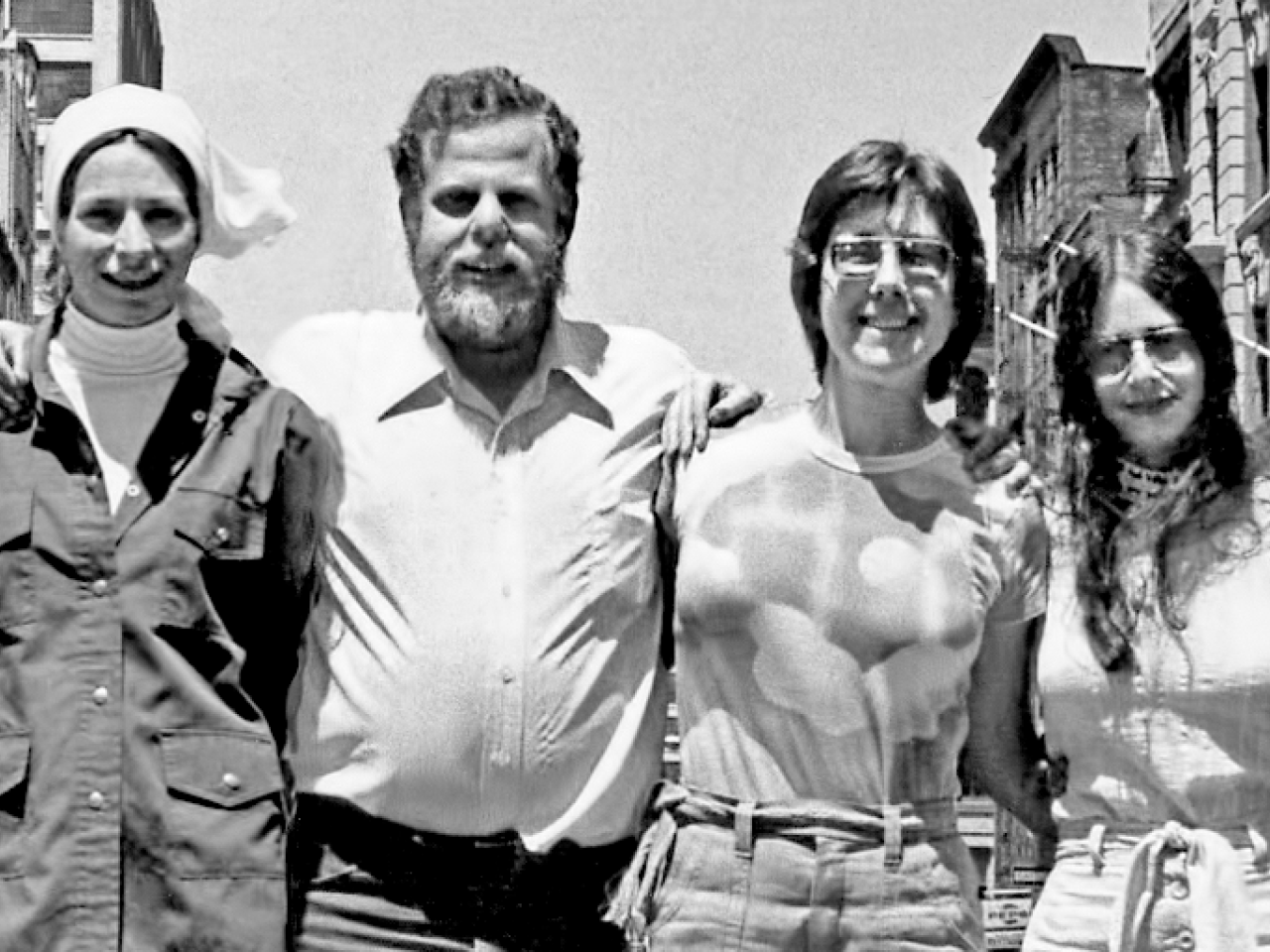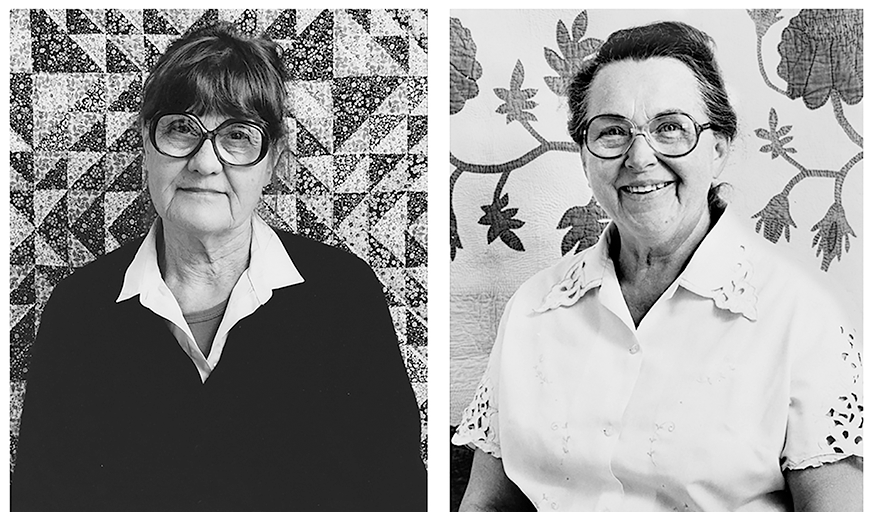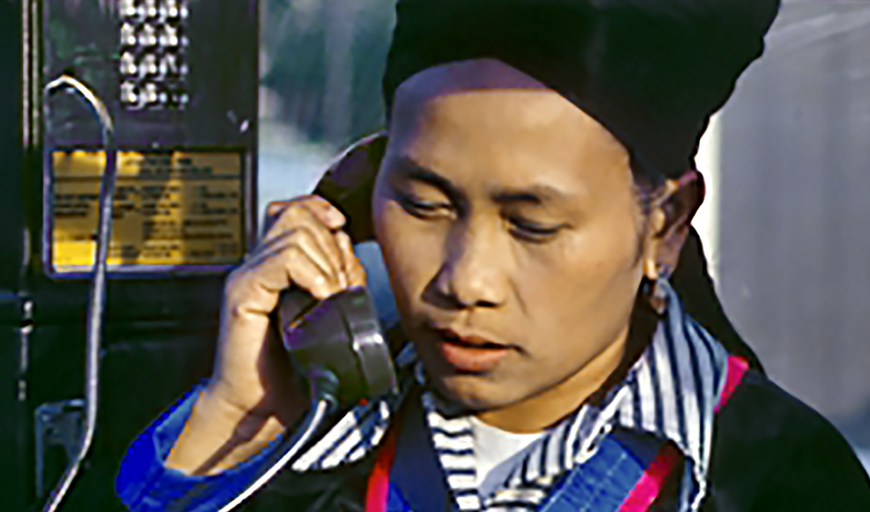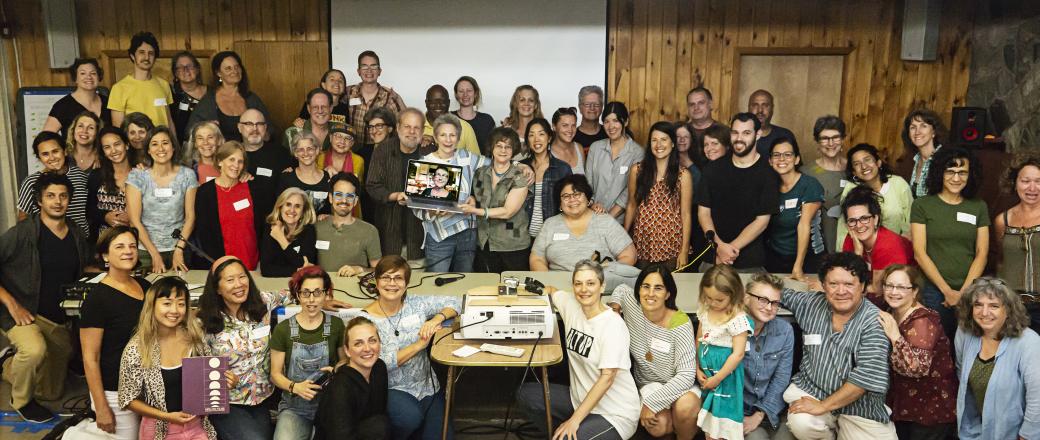Still Here, Still Strong: New Day Films Celebrates 50 Years of Great Filmmaking

New Day Co-founders from left to right: Liane Brandon, Jim Klein, Julia Reichert, and Amalie R. Rothschild.
Poised to celebrate its 50th Anniversary in 2021-2022, New Day Films is the oldest continuously functioning member-owned film cooperative in the world. Its existence is an extraordinary feat of economic democracy wedded to filmmaking excellence that remains devoted to human rights and distributing progressive social change-making media.
The 50th year will be celebrated with a historic retrospective of 50 films that will be accessible on digital platforms and travel the country as soon as in-person events are possible again.
New Day Films was founded in 1971 by four filmmakers to distribute their three feminist films for which educational distributors at the time claimed there was no audience: Growing Up Female by Julia Reichert and Jim Klein, Anything You Want To Be by Liane Brandon, and Amalie R. Rothschild's It Happens To Us. How wrong the naysayers were! "The whole idea of distribution," noted co-founders Julia Reichert and Liane Brandon "was to help the women's movement grow. Films could do that; they could get the ideas out. We could watch the women's movement spread across the country just by who was ordering our films. First it was Cambridge and Berkeley, and then the first showing in the deep South.”
By 1974 the fledgling cooperative explored the issue of men’s socialization with the inclusion of Men’s Lives by Josh Hanig and Will Roberts. As the number of members expanded, films dealing with the new social history that recognized the legitimacy of ordinary lives, people whose race, class and gender rendered them invisible, marginalized or ignored, joined the co-op’s catalogue. When Debra Chasnoff and Helen Cohen came on board, New Day Films committed itself to films on the cutting edge of the gay rights movement. As New Day Films grew decade by decade, it became a locus for films about the rights of indigenous people, racial equality and justice, asylum seekers and other immigrants, LGBTQ rights, human rights around the globe and environmental issues including the campaign to save the planet from the effects of global warming.
From the original four founders with three titles in 1971, New Day Films has grown to more than 300 titles and 140 filmmaker member-owners today in 2021. It functions as a participatory democracy whose organizational structure and business practices embody the values promoted by its films. Members sustain the ideals that inspired the cooperative’s formation in 1971–egalitarian partnership, great stories, and ideas to hasten change–and curate its collection to encompass a wide range of subject areas.
New Day Films has survived in the competitive educational distribution arena because it has always managed to stay ahead of the media curve, starting with 16mm film, moving early into VHS, then DVD, in 1996 establishing a website and, finally, streaming in 2008.
Once a year, New Day Films members gather from across the United States for a four-day conference to make decisions about our business and to elect the Steering Committee (New Day Films’ management team). In addition to marketing our individual films, all active members volunteer time to run the business, from acquisitions to promotion, website to finance. Throughout the year, members perform tasks, communicate online about major issues and meet to carefully select all the new filmmakers and films in our collection. To ensure transparent communication and effective fulfillment, we also enlist professional partners to support our operations.
Our films have won Academy Awards, Emmy Awards, and hundreds of prizes from prestigious film festivals. They have been broadcast worldwide and showcased in theaters. New Day Films has become preeminent in academia where the films’ high quality and pertinence to curricula are much prized. The New Day Films cooperative has remained a filmmaking and distribution powerhouse by renewing itself annually with a fresh and diverse cohort of films and filmmakers who are media activists willing to do the hard work of self-distribution, just as the founders did.
As we celebrate our 50th year we want to highlight some of the most significant films from our first two decades, which are still making people think and creating social change. The three founding films seem like the right ones to begin with, along with one more from the 1970s and two from the 1980s. Throughout this year in future newsletters, we will feature game-changing films from the remaining three decades.
1970s

Growing Up Female (1971) by Julia Reichert and Jim Klein was the first major documentary about the experience of being a woman in America, and possibly the most comprehensive and sociologically ambitious film to come out of the women’s movement. It is an articulate and sometimes frightening study of how, in the process of growing up, girls are continually kept prisoners of oppressive social structures. With a minimum of commentary, it shows how female human beings are brainwashed into passivity and self-contempt. Groundbreaking at the time of its release, it opened the doors to consciousness raising, was inducted into the Library of Congress Great American Films roster and, 50 years on, is still relevant.

Anything You Want To Be (1971) by Liane Brandon is probably the most concise introduction to the conundrum of women’s socialization ever made. Only 8 minutes long, it is a wry look at society’s indoctrination of women to conform to conventional norms of “femininity” by giving them the illusion of free choice. The heroine is a bright high school student who is told she can “be anything she wants to be” and is then deflected from running for class president toward the office of secretary, from going into medicine to be a doctor to instead studying nursing, and so on. When she fantasizes about her future life, her dreams become nightmares populated by mass media stereotypes. The two levels of the film are effectively blended as a biting satire on the pressures of family, peers and society.

It Happens to Us (1972) by Amalie R. Rothschild was made in 1971, two years before the Roe vs. Wade Supreme Court decision. It is a first on several levels: the first documentary made by an all-woman crew, and the first to address freedom of choice and a woman’s right to end a pregnancy. Women of different ages, marital status and race speak candidly about their abortion experiences, revealing the problems of illegal versus legal medically safe procedures. They speak to the need for understanding the personal situations underlying this emotional issue. The film was excerpted on an NBC TV series hosted by David Frost in 1973. It remains a vital reminder that as long as the availability of legal abortion remains limited or threatened outright, it is important that contemporary audiences know the consequences of abortion being illegal, and what life was like before Roe vs Wade.

Men's Lives
Men’s Lives (1974) by Josh Hanig and Will Roberts. Added to the New Day Films collection in 1974, Men’s Lives is the pioneering film delving into issues of masculinity in America. A complement to Growing Up Female, it marked the beginning of New Day’s expansion into covering other progressive social issues. It deals with the pressures, competition and loneliness of being male in the United States. The filmmakers interview men, boys, and some women; workers, teachers, coaches, athletes and students to examine how the American male is conditioned to aggressively compete, win and strive for material success at the expense of intimacy and communication. Interspersed with movie clips of heroes like John Wayne, football games and Superman comic books, the film exposes deep-seated stereotypes of masculinity to the light of day.
Men's Lives is currently unavailable. A digitally restored version should be added to the New Day Films website by the end of 2021.
1980s

Quilts in Women’s Lives (1981) by Pat Ferrero won all the major festival awards when it was released and became a staple of Women’s Studies courses. It undermines notions minimizing women’s artistic achievements by profiling seven traditional quiltmakers, demolishing the idea that “little old ladies” make quilts because they have nothing better to do. The film reveals the quietly radical ways quilts are used to record heritage and traditions, and how fundamental they can be to our understanding of social history. The film became a vital part of the feminist dialog about women’s lives, voices, and creativity, showing how women have both embraced and subverted their “socialization to the needle.”

Becoming American (1982) by Ken Levine and Ivory Waterworth Levine captures and humanizes the disorientation and culture shock new immigrants experience in trying to adjust to life in the United States. It is the story of a Hmong family from Laos who are granted immigration status after 6 years in a Thai refugee camp. The film reveals how alien our country and its routines appear to them and shows the complexities and hardships they must endure as they strive to integrate. Within nine months of arriving in the US, the family is in the process of “becoming American.” Used by the United Nations High Commission for Refugees and screened for refugee hearings in the U.S. House of Representatives, the film was one of the first to address immigration issues in the United States and deliver an effective message about our shared humanity. It is more relevant than ever today in our polarized society fraught with anti-immigrant prejudices and policies.
Stay tuned throughout the year as we continue to highlight films from the New Day Films catalogue that have changed the world! Here’s to 50 more years.

New Day Members at the 2018 (pre-COVID) Annual Meeting